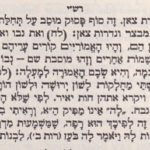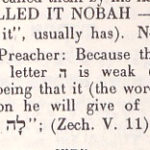The word לה has no Mappik in the ה (as the word לָהּ “to it”, usually has). Now I have seen the following in the work of rabbi Moshe haDarshan (Moses the Preacher): Because this name did not remain permanently to it, therefore the letter ה is weak (without a Mappik), — the implication of his explanation being that it (the word לה) is the same as לא “not”. But I wonder what explanation he will give of the two words similar to it, (Ruth 2:14): “And Boaz said לָה”, and (Zechariah 5:11): “to build a house לָה”.Mattos, Numbers 32:42 Sefaria


$21.00 Amazon Pentateuch: with Targum Onkelos, Haphtaroth and Rashi’s Commentary–Numbers (Hardcover)
by annotated by M. Rosenbaum and A. M. Silbermann with A. Blakshi and L. Joseph Translated






